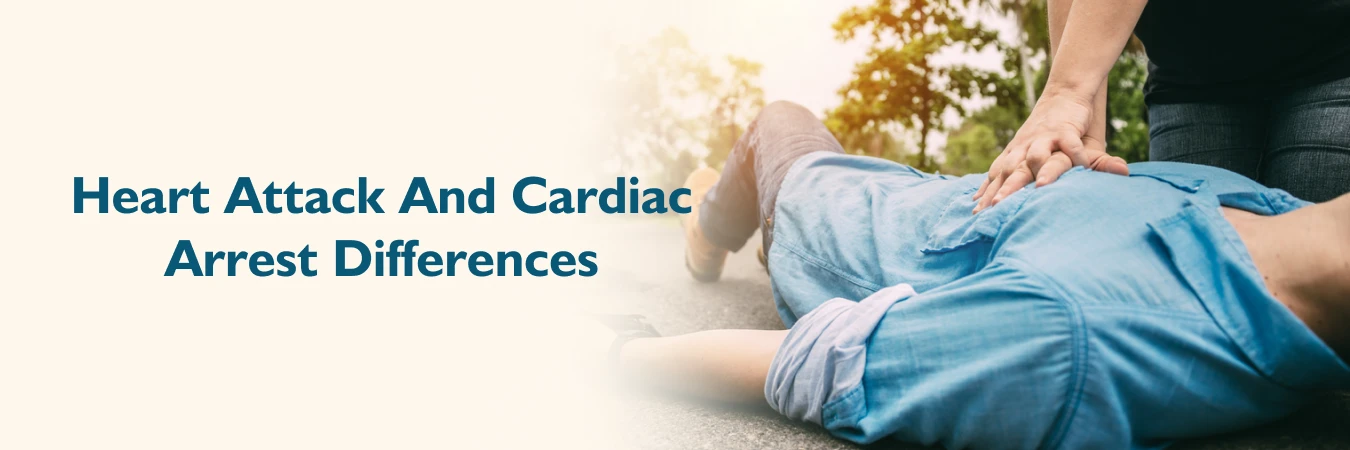- Cardiology 84
- Dermatology 45
- Endocrinology 33
- ENT 16
- Fertility 190
- Gastroenterology 78
- General-Medicine 81
- Gynecology 80
- Hematology 19
- Infectious-Diseases 33
- Neurology 52
- Oncology 34
- Ophthalmology 23
- Orthopedics 69
- Pediatrics 31
- Procedure 23
- Public-Health 144
- Pulmonology 59
- Radiology 8
- Urology 68
- Wellness 161
- Woman-and-child 77

Cardiac Arrest vs Heart Attack
We frequently encounter phrases like It was a heart attack and "he died of cardiac arrest," both of which relate to heart problems. Despite their common usage, these terms are not interchangeable and describe different conditions. Are there any similarities between a heart attack and cardiac arrest, or do they differ fundamentally? Let’s examine each term to uncover their distinctions and similarities.
Secure your health with a second opinion. Make informed decisions and book your appointment today!
Get A Second OpinionWhat is a Heart Attack?
A heart attack occurs when blood flow to the heart is blocked, usually by a blood clot or plaque build-up in an artery. Since the heart muscle needs oxygen to survive, the muscle begins to contract when blood flow is blocked. The person begins to feel pressure in the chest or might experience shortness of breath or fatigue several weeks before the heart attack.
Warning Signs of Heart Attack?
Don`t wait to get help if you experience these warning signs of a heart attack. Some heart attacks are sudden and intense. But most start slowly, with mild pain or discomfort. Pay attention to your body if you experience the below things
- Most heart attacks involve discomfort in the centre of the chest that feels like uncomfortable pressure, squeezing, fullness or pain.
- Discomfort in other areas of the upper body which may include pain or discomfort in one or both arms, the back, neck, jaw or stomach.
- Dyspnea may or may not be accompanied by chest discomfort
- Other possible signs include breaking out in a cold sweat, nausea or lightheadedness
Ready to take control of your health journey? Book your appointment now and start your path towards wellness today!
Book an AppointmentWhat is Cardiac Arrest?
Cardiac arrest is one of the most common heart conditions that can be life-threatening if not treated promptly. This is when the heart suddenly stops beating. Since our heartbeat is controlled by electrical impulses, when these impulses change the rhythm, the heart rhythm can become irregular, leading to arrhythmia. When the heart stops, it leads to fatality.
Warning Signs of Cardiac Arrest
For many people, cardiac arrest occurs without any warning signs. However, some people experience warning signs before the heart stops. These may include:
- Chest pain
- Dizziness
- Palpitationss
- Fainting
- Breathlessness
Someone who has already had a cardiac arrest will be:
- Unconscious
- Unresponsive
- Not breathing
Difference between Cardiac Arrest and Heart Attack
Cardiac Arrest
- Cardiac arrest is a sudden loss of heart function, typically due to an electrical malfunction in the heart that causes an irregular heartbeat (arrhythmia).
- It results in an abrupt cessation of blood flow to the body, causing loss of consciousness and absence of pulse and breathing.
- Immediate treatment with CPR (cardiopulmonary resuscitation) and defibrillation is crucial to restore normal heart function and prevent death.
Heart Attack (Myocardial Infarction)
- A heart attack occurs when blood flow to part of the heart muscle is blocked, usually due to a blood clot in a coronary artery.
- It causes damage or death to the heart muscle tissue deprived of oxygen and nutrients.
- Symptoms may include chest pain or discomfort, shortness of breath, sweating, and nausea.
- Prompt medical treatment is necessary to restore blood flow to the affected area of the heart and minimize heart muscle damage.
Citations
Watch: What's the difference between a heart attack and a cardiac arrest?Frequently Asked Questions
Heart attack symptoms include chest pain, shortness of breath, and discomfort in the upper body. Cardiac arrest causes sudden collapse, unconsciousness, and no pulse.
Both can be life-threatening, but quick medical response can improve survival chances. CPR and defibrillation (shocking the heart) are crucial for cardiac arrest.
Heart attacks are treated with medications, angioplasty (opening blocked arteries), or bypass surgery. Cardiac arrest requires immediate CPR and use of a defibrillator to restart the heart.
Call emergency services immediately. For a heart attack, stay with the person and offer aspirin if recommended. For cardiac arrest, start CPR and use an automated external defibrillator (AED) if available.
Encourage healthy habits, help manage medications, attend cardiac rehabilitation, and learn CPR skills for emergencies.

- Cardiology 2132
- Dermatology 168
- Endocrinology 135
- ENT 97
- Fertility 217
- Gastroenterology 232
- General 478
- General-Medicine 1685
- Gynecology 169
- Hematology 85
- Infectious-Diseases 208
- Neurology 207
- Oncology 345
- Ophthalmology 65
- Orthopedics 187
- Pediatrics 83
- Procedure 72
- Public-Health 209
- Pulmonology 126
- Radiology 13
- Second Opinion 311
- Urology 294
- Wellness 600
- Woman-and-child 447
- Others 10217
Related Blogs
If you have any questions, please fill out the enquiry form or call us, and we will get back to you promptly.
040-68334455